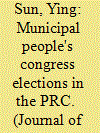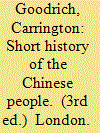| Srl | Item |
| 1 |
ID:
125804


|
|
|
|
|
| Publication |
2013.
|
| Summary/Abstract |
China's new five-year plan recognised the looming insecurity in its agricultural sector. On the one hand, the country faces a diminishing arable land supply; on the other, a large population with rapidly increasing diets. Although large-scale trade and investment in this sector has been developing since the mid 1990s between China and a variety of African states, it is a relatively new addition to the more established China-Southeast Asian economic relationship. This article seeks to explore the impact that China's agricultural investments are having on two Southeast Asian countries - Indonesia and the Philippines - where there has been a marked increase in activities by Chinese firms in agricultural produce. The findings from these two case studies - and a series of smaller studies of the situation in other regional states - are used as a benchmark to clarify some of the consequences of China's agricultural investment from Southeast Asia for regional food security.
|
|
|
|
|
|
|
|
|
|
|
|
|
|
|
|
| 2 |
ID:
127779


|
|
|
|
|
| Publication |
2014.
|
| Summary/Abstract |
Congress elections are an important part of political-legal studies in China. The literature has covered the direct election process, voters' attitudes and behaviors, and Party-congress-government relations in Chinese elections. Based on on-site observations, interviews and first-hand documents, this article explores the process of indirect elections at the municipal level. This article examines the interaction among institutions taking part in the municipal congress elections. It also addresses how the social structure changes affect congress elections and deputy compositions. It reveals that an implicit function of the congress election is to co-opt new social groups and interests into the establishment. Such co-option is an adaptive strategy of the Party state in the reform era.
|
|
|
|
|
|
|
|
|
|
|
|
|
|
|
|
| 3 |
ID:
140164


|
|
|
|
|
| Edition |
3rd ed.
|
| Publication |
London, George Allen and unwin Ltd, 1969.
|
| Description |
xiii, 295p.: mapspbk
|
| Standard Number |
049510169
|
|
|
|
|
|
|
|
|
|
|
|
Copies: C:1/I:0,R:0,Q:0
Circulation
| Accession# | Call# | Current Location | Status | Policy | Location |
| 004292 | 951/GOO 004292 | Main | On Shelf | General | |
|
|
|
|
| 4 |
ID:
133812


|
|
|
|
|
| Publication |
2014.
|
| Summary/Abstract |
To win the hearts and minds of the Chinese people, Chinese Communist leaders launched a series of educational reforms to instill new socialist ideas and nationalistic fervor in kindergarteners immediately after the founding of the People's Republic of China in 1949. Under the strong influence of Soviet advisers and through a number of methods (games, singing, storytelling, site visits), Chinese kindergarteners were taught the nobility of labor, the sacrifice of soldiers, the grandeur of Tiananmen Square, the wise leadership of Chairman Mao Zedong, and the evilness of enemies. However, contrary to the conventional view, this article argues that Chinese education officials and kindergarten teachers never blindly followed Soviet educational models. They appropriated Moscow's techniques to suit their domestic needs, which included promoting nationalist feelings among children to consolidate the Chinese Communist Party's legitimacy and power. Ultimately, Chinese kindergarteners were turned into Party loyalists, not admirers of a foreign socialist model. Although the Party encountered difficulties in recruiting reliable teachers to implement its policies, it was able to impose nearly total control from above over the political content of kindergarten education. Under the one-party system, Chinese children were only taught what the Communist leaders wanted them to learn.
|
|
|
|
|
|
|
|
|
|
|
|
|
|
|
|